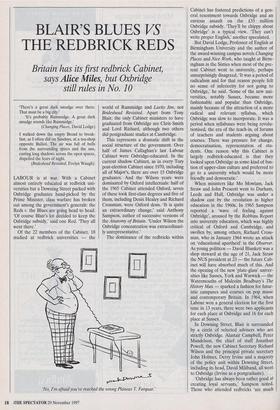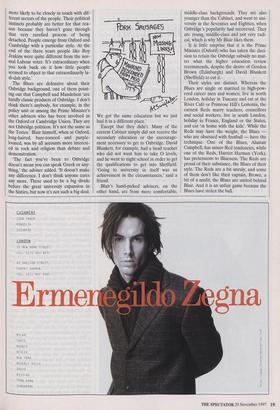BLAIR'S BLUES VS
THE REDBRICK REDS
Britain has its first redbrick Cabinet, still rules in No. 10
`There's a great dark smudge over there. That must be a big city.'
`It's probably Rummidge. A great dark smudge sounds like Rummidge.'
(Changing Places, David Lodge)
I walked down the empty Broad to break- fast, as I often did on Sundays, at a tea-shop opposite Balliol. The air was full of bells from the surrounding spires and the sun, casting long shadows across the open spaces, dispelled the fears of night.
(Brideshead Revisited, Evelyn Waugh).
LABOUR is at war. With a Cabinet almost entirely educated at redbrick uni- versities but a Downing Street packed with Oxbridge graduates hand-picked by the Prime Minister, class warfare has broken out among the government's generals: the Reds v. the Blues are going head to head. `Of course Blair's lot decided to keep the Oxbridge subsidy,' said one Red. 'They all went there.'
Of the 22 members of the Cabinet, 18 studied at redbrick universities — the world of Rummidge and Lucky Jim, not Brideshead Revisited. Apart from Tony Blair, the only Cabinet ministers to have graduated from Oxbridge are Chris Smith and Lord Richard, although two others did postgraduate studies at Cambridge.
This represents a dramatic shift in the social structure of the government. Over half of James Callaghan's last Labour Cabinet were Oxbridge-educated. In the current shadow Cabinet, as in every Tory post-election Cabinet since 1970, including all of Major's, there are over 15 Oxbridge graduates. And the Wilson years were dominated by Oxford intellectuals: half of the 1965 Cabinet attended Oxford, seven of these took first-class degrees and five of them, including Denis Healey and Richard Crossman, were Oxford dons. 'It is quite an extraordinary change,' said Anthony Sampson, author of successive versions of the Anatomy of Britain. 'Under Wilson the Oxbridge concentration was extraordinari- ly unrepresentative.'
The dominance of the redbricks within No, I'm afraid you've reached the wrong Phineas T. Farquar.' Cabinet has fostered predictions of a gen- eral resentment towards Oxbridge and an envious assault on the £35 million Oxbridge subsidy. 'They'll be chippy about Oxbridge' is a typical view. 'They can't write proper English,' another speculated.
But David Lodge, Professor of English at Birmingham University and the author of the award-winning campus novels Changing Places and Nice Work, who taught at Birm- ingham in the Sixties when most of the pre- sent Cabinet went to university, perhaps unsurprisingly disagreed. 'It was a period of radicalism and for that reason people felt no sense of inferiority for not going to Oxbridge,' he said. 'Some of the new uni- versities, notably Sussex, became more fashionable and popular than Oxbridge, mainly because of the attraction of a more radical and relevant syllabus, which Oxbridge was slow to incorporate. It was a period when syllabuses were being revolu- tionised, the era of the teach-in, of forums of teachers and students arguing about courses. There was pressure for change, democratisation, representation of stu- dents. One reason why this Cabinet is largely redbrick-educated is that they looked upon Oxbridge as some kind of bas- tion of upper-class culture and preferred to go to a university which would be more friendly and democratic.'
When ministers like Mo Mowlam, Jack Straw and John Prescott went to Durham, Leeds and Hull, Oxbridge was under a shadow cast by the revolution in higher education in the 1960s. In 1965 Sampson reported a 'wave of feeling against Oxbridge', aroused by the Robbins Report into university education, which was highly critical of Oxford and Cambridge, and swollen by, among others, Richard Cross- man, who in January 1964 wrote an attack on 'educational apartheid' in the Observer. As young politicos — David Blunkett was a shop steward at the age of 21, Jack Straw the NUS president at 23 — the future Cab- inet will have absorbed much of this. And the opening of the new 'plate-glass' univer- sities like Sussex, York and Warwick — the Watermouths of Malcolm Bradbury's The History Man — sparked a fashion for futur- istic campuses and courses on pop music and contemporary Britain. In 1964, when Labour won a general election for the first time in 13 years, there were two applicants for each place at Oxbridge and 16 for each place at Sussex.
In Downing Street, Blair is surrounded by a circle of selected advisers who are strictly Oxbridge. Alastair Campbell, Peter Mandelson, the chief of staff Jonathan Powell, the new Cabinet Secretary Richard Wilson and the principal private secretary John Holmes, Derry Irvine and a majority of the policy unit within Downing Street, including its head, David Miliband, all went to Oxbridge (Irvine as a postgraduate).
`Oxbridge has always been rather good at creating loyal servants,' Sampson noted. Those who attended redbricks 'are much more likely to be closely in touch with dif- ferent sectors of the people. Their political instincts probably are better for that rea- son because they haven't gone through that very rarefied process of being detached. People emerge from Oxford and Cambridge with a particular style. At the end of the three years people like Roy Jenkins were quite different from the nor- mal Labour voter. It's extraordinary when you look back on it how little people seemed to object to that extraordinarily la- di-dah style.'
The Blues are defensive about their Oxbridge background, one of them point- ing out that Campbell and Mandelson 'are hardly classic products of Oxbridge. I don't think there's anybody, for example, in the policy unit or among the Prime Minister's other advisers who has been involved in the Oxford or Cambridge Union. They are not Oxbridge politicos. It's not the same as the Tories.' Blair himself, when at Oxford, long-haired, bare-torsoed and purple- looned, was by all accounts more interest- ed in rock and religion than debate and demonstration.
The fact you've been to Oxbridge doesn't mean you can speak Greek or any- thing,' the adviser added. 'It doesn't make any difference. I don't think anyone cares any more. There used to be a big divide before the great university expansion in the Sixties, but now it's not such a big deal. We got the same education but we just had it in a different place.'
Except that they didn't. Many of the current Cabinet simply did not receive the secondary education or the encourage- ment necessary to get to Oxbridge. David Blunkett, for example, had a head teacher who did not want him to take 0 levels, and he went to night school in order to get the qualifications to get into Sheffield. `Going to university in itself was an achievement in the circumstances,' said a friend.
Blair's hand-picked advisers, on the other hand, are from more comfortable, middle-class backgrounds. They are also younger than the Cabinet, and went to uni- versity in the Seventies and Eighties, when Oxbridge's popularity had recovered. They are young, middle-class and not very radi- cal, which is why Mr Blair likes them.
It is little surprise that it is the Prime Minister (Oxford) who has taken the deci- sion to retain the Oxbridge subsidy no mat- ter what the higher education review recommends, despite the desire of Gordon Brown (Edinburgh) and David Blunkett (Sheffield) to cut it.
Their styles are distinct. Whereas the Blues are single or married to high-pow- ered career men and women, live in north London, holiday in Tuscany and eat at the River Café or Primrose Hill's Lemonia, the earnest Reds marry teachers, councillors and social workers, live in south London, holiday in France, England or the States, and eat 'at home with the kids'. While the Reds may have the weight, the Blues who are obsessed with football — have the technique. One of the Blues, Alastair Campbell, has minor Red tendencies, while one of the Reds, Harriet Harman (York), has pretensions to Blueness. The Reds are proud of their substance, the Blues of their style. The Reds are a bit unruly, and some of them don't like their captain, Brown, a bit of a misfit; the Blues are united behind Blair. And it is an unfair game because the Blues have stolen the ball.



















































































 Previous page
Previous page